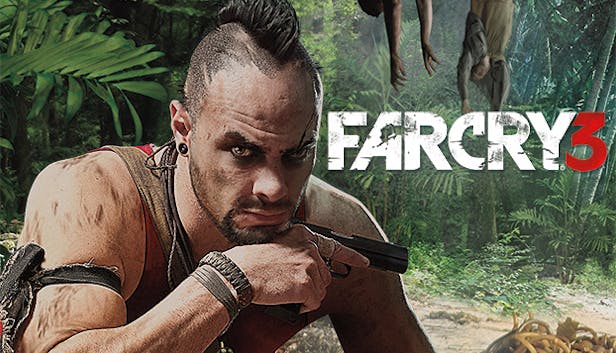
And that game is Far Cry 3.
Far Cry 3 tried to do a lot of things, all through the lens of vicious satire. And like the movies: Starship Troopers and Robocop (the original), a lot of people missed the joke. Most of it seemed really obvious to me. But one thing I noticed thst did catch me off guard was a repeating motif, the assertion that conquerors go mad. They devour each other. They devour themselves.
The main arc of the story missions shows Jason Brody and his transformation from dumb dudebro uncomfortable with violence into a psychopath for violence is the easiest path to a solution. Presented as a stinging critique of how video games depict violence, the game mirror Jason and his path through multiple other characters: agent Willis Huntley, the mercenary known as Buck, the undercover operative Sam, Dr. Earnhardt, and of course Vaas. All of them mirror some dark aspect of Jason and his journey. And the only ones who survive are the ones who realize that the battle isn't worth fighting. Vaas in particular is Jason's dark opposite, lieutenant to Hoyt as Jason becomes to Citra, losing his way to the path of violence, going mad and being unable to see i; Vaas and Jason reflect each other to a startling degree. But the key revelation to the game, and the one that generated much outrage amongst gamers, was the fact that Jason kills Vaas at only the halfway point in the game. They felt as though Vaas should have been the final boss and didn't understand why the game kept going after that.
And that was the point. After killing Vaas, Jason's friends get the boat they had found working. Jason has (as far as he knows) rescused all of his surviving friends and family. His friends safe, an escape route found, the man who killed his brother before his eyes dead; Jason could leave here and the ending would work. The fact that jason refuses to leave, is the point. Even agent Willis Huntley cuts and leaves here (and thus survives to apepar in the sequel). Jason is missing the point, he is crossing over from hero into monster. Up to this point, Jason and the player can justify what they do as heroic. But not any longer. From here on out, they are in it for the violence. Just to drive the point home, the game gives Jason back his litttle brother- thought dead- and in order to maintain his cover, Jason tortures his brother. And thus in the ending, when Jason must choose between his friends and family and the life of violence he has grown to love, the game explicitly threatens to delete his save files if the player chooses Jason's friends. And if you give in, Jason will be murdered by Citra to maintain her position, just as he murdered his way up the food chain.
And then, just to drive the point home- the player (and Jason) are dumped back on the island to engage in more violent play, as if to say: "Isn't this what you wanted?"
No comments:
Post a Comment